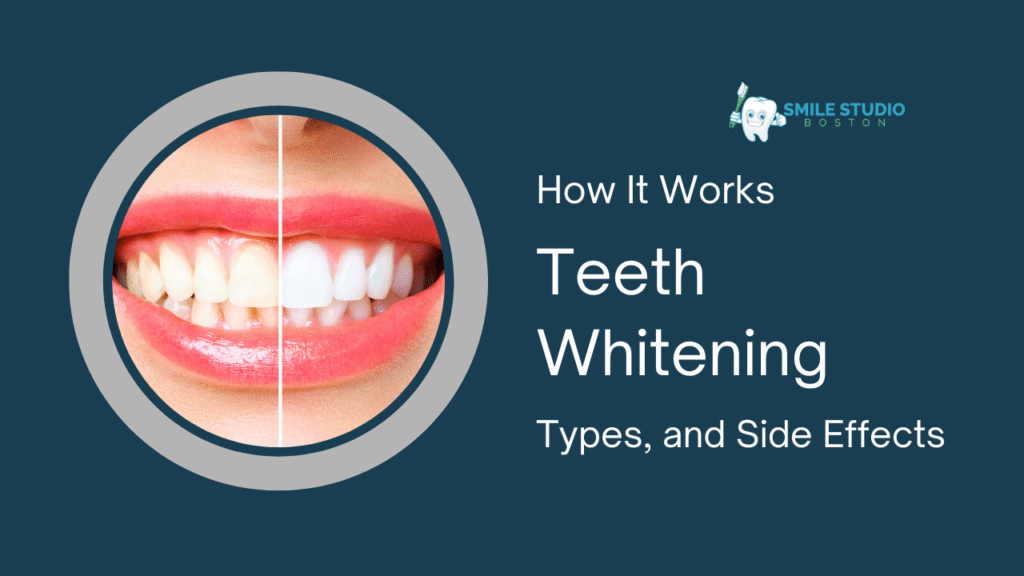I. What Is Teeth Whitening and How Does It Work?
Teeth whitening is a cosmetic dental procedure designed to lighten the shade of your natural teeth by removing stains and discoloration. It’s one of the most popular ways people enhance their smiles—and for good reason. A brighter smile often leads to improved confidence and a more youthful appearance.
So, how does teeth whitening work? The process involves applying bleaching agents that penetrate the outer layer of your teeth—known as enamel—to break apart stain molecules. This results in a whiter, cleaner-looking surface.
Whitening Agents: What’s in the Formula?
There are two main active ingredients commonly used in teeth whitening:
- Hydrogen Peroxide – A powerful bleaching agent that works quickly to lift both surface-level and deeper stains.
- Carbamide Peroxide – A gentler compound that breaks down into hydrogen peroxide over time. It’s typically used in at-home kits due to its slower release and reduced sensitivity.
These agents are safe when applied correctly and under the supervision of a dental professional. However, misuse or overuse—especially with over-the-counter kits—can lead to enamel damage or increased sensitivity.
II. Different Types of Tooth Stains
Not all tooth stains are created equal, and understanding the type of discoloration you have is key to choosing the most effective teeth whitening solution. Generally, dental professionals categorize stains into two main types: intrinsic and extrinsic.
Intrinsic Stains: Below the Surface
Intrinsic stains occur within the tooth enamel. They can be caused by:
- Aging and natural enamel thinning
- Certain medications (like tetracycline)
- Fluoride overexposure in childhood
- Trauma or developmental conditions
Because these stains are embedded deeper inside the tooth, they’re more difficult to treat. Over-the-counter products often don’t penetrate deeply enough to make a difference. In such cases, professional teeth whitening at a clinic like SmileStudio is typically required for noticeable improvement.
Extrinsic Stains: Surface-Level Discoloration
Extrinsic stains are found on the outer layer of the tooth. They’re caused by everyday habits, such as:
- Drinking coffee, tea, or red wine
- Smoking or chewing tobacco
- Poor oral hygiene
- Consuming foods with strong pigments
These stains are more superficial and usually respond well to whitening toothpastes, home kits, and professional cleanings. However, professional teeth whitening still offers the fastest and most dramatic results, especially when stains have built up over time.
III. Main Teeth Whitening Methods
There are three main ways to brighten your smile with teeth whitening:
1. Over-the-Counter Products
These include whitening toothpaste, strips, and rinses. They’re affordable and easy to use, but offer limited results. Best for mild, surface-level stains.
2. At-Home Whitening Kits
These kits come with gels and trays (sometimes with LED lights). They work better than OTC products but can cause sensitivity if misused. Results usually show in 2–4 weeks.
IV. Common Side Effects and How to Minimize Them
Teeth whitening is generally safe, but a few side effects can occur:
You may feel a temporary twinge when eating hot or cold foods. Using sensitive toothpaste before and after treatment can help.
Whitening gels that touch your gums may cause slight burning or redness. This usually happens with ill-fitting trays.
Is Teeth Whitening Right for You?
Teeth whitening is ideal for people with healthy, natural teeth who want to remove stains and brighten their smile. It works best on yellowish discoloration and surface stains from coffee, tea, wine, or tobacco.
Eligibility: Natural Teeth & Good Oral Health
You’re a good candidate if:
- Your teeth are natural (not crowns, veneers, or implants)
- You have healthy gums and no untreated cavities.
- You aren’t pregnant or nursing.
When to Consult a Dentist First
If you have sensitive teeth, gum issues, or dental restorations, it’s important to talk to your dentist before starting teeth whitening. At SmileStudio in Boston, your oral health is always the top priority. The team will evaluate your condition and recommend the safest whitening approach for your needs.
Transform Your Smile Today with SmileStudio!
At SmileStudio, we believe everyone deserves a confident, healthy smile. Whether you need routine care, cosmetic enhancements, or advanced dental treatments, our expert team is here to support your journey.
Schedule Your Appointment Today!
✅ Expert Team
Looking for a crown dentist, implant dentist, or veneer dentist? Our experienced team delivers personalized care with proven results.
✅ Flexible Payment Options
We offer flexible payment plans to make high-quality dental care affordable and accessible for every patient.
✅ Emergency Dental Care
Our emergency dentist services are here for you—day or night—because dental pain can’t wait.
✅ Walk-In Appointments
Busy schedule? No problem. Our walk-in dental office makes care available when it’s convenient for you.
✅ Accepting Mass Health
SmileStudio proudly serves as a dentist that accepts MassHealth, so you can get the care you need without financial barriers.
Ready for a brighter smile? Contact us today to book your appointment—we’re excited to welcome you.
📞 Call Us: +1 (617) 265-5606
📧 Email: smilestudioboston@gmail.com
🌐 Visit: smilestudioboston.com
📍 Location: 1428 Dorchester Ave, Dorchester, MA 02122, United States
SmileStudio – Where Beautiful Smiles Begin.
Book your appointment now!

FAQs
Q. How long do results last?
Professional teeth whitening can last 6–12 months with good oral hygiene and regular dental checkups.
Q. Is it safe for sensitive teeth?
Yes, but it’s best to choose dentist-supervised whitening. SmileStudio offers treatments designed to minimize discomfort for sensitive teeth.
Q. Can you whiten veneers?
No. Teeth whitening only works on natural teeth. Veneers, crowns, or fillings won’t change color.
Q. How much does it cost in Boston?
At SmileStudio, professional teeth whitening typically ranges from $250–$600, depending on the method used. Financing options may be available.


